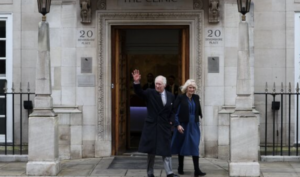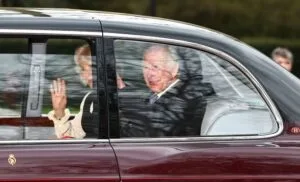
King Charles III Faces Health Challenges Amidst Royal Duties
King Charles III, the reigning monarch of the United Kingdom, has encountered significant health hurdles since ascending to the throne less than two years ago. Diagnosed with a form of cancer shortly after his coronation, the King has been compelled to temporarily withdraw from public engagements to focus on his treatment. Despite the setbacks, he remains resolute in his determination to resume full royal duties at the earliest opportunity.
In a recent public appearance, King Charles, accompanied by Queen Camilla, was seen departing from Clarence House en route to Sandringham, where they arrived via helicopter after a brief stop at Buckingham Palace. While the specific medical facility where the King is receiving outpatient care has not been disclosed, it is known that he has initiated a rigorous treatment regimen under the care of a distinguished medical team.
Amidst speculation surrounding Prince Harry’s absence during this period, it is believed that he holds deep concern for his father’s well-being, despite not being physically present. Several members of the royal family, including Princess Beatrice and her husband Edoardo Mapelli Mozzi, have already visited King Charles at Clarence House, with expectations of more family members visiting as they become informed about his condition.

Although the exact nature of King Charles’ cancer has not been specified, it was detected during routine prostate treatment last month, leading to a brief hospital stay followed by the commencement of treatment. The King maintains a positive outlook on his prognosis, grateful that the illness was identified in its early stages.
As news of the King’s health spreads, there have been concerns regarding the potential implications for the monarchy. However, it is imperative to acknowledge that King Charles is receiving top-tier medical care and is supported by a robust network of individuals.
Earlier health concerns for King Charles involved treatment for an enlarged prostate, a common condition among men over 50, which was conducted at a private clinic in London. His transparency regarding his health issues aims to raise awareness about prostate health, resulting in increased public interest in the matter.
These health challenges come at a pivotal moment for King Charles as he adjusts to his role as monarch following the passing of his mother, Queen Elizabeth II. Despite facing personal tribulations, his commitment to his royal duties, reminiscent of his mother’s dedication, has garnered widespread support from the public.
